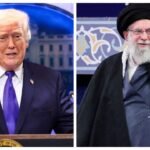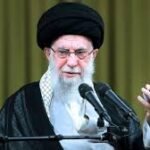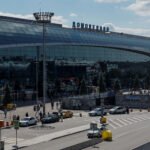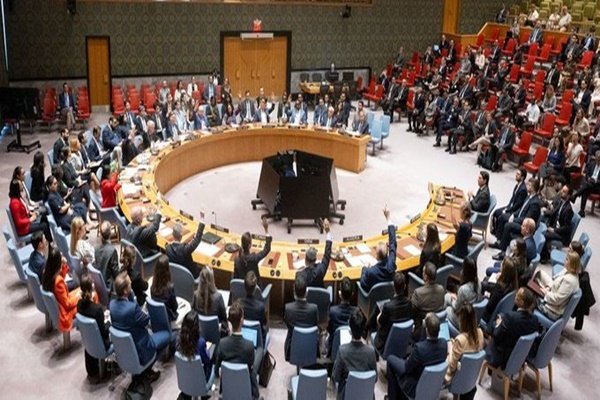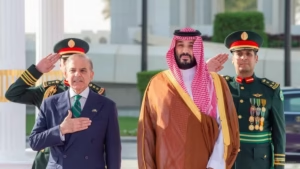Deputy US Special Envoy to the Middle East Morgan Ortagus casts a veto as members of the UNSC vote on a draft resolution demanding a ceasefire in Gaza, at U.N. headquarters in New York City on September 18, 2025. (Photo: Reuters)
UN Headquarters (New York): The United States has again exercised its veto at the United Nations Security Council (UNSC), blocking a resolution calling for a ceasefire in Gaza. This is the sixth time in nearly two years that Washington has used its veto to halt a resolution crucial for civilians in the strip.
The draft resolution was backed by 10 non-permanent members and supported by all permanent members except the United States. Fourteen members voted in favour, and one voted against. The result leaves the Security Council powerless in the face of rising humanitarian crises.
Morgan Ortagus, deputy envoy of the United States for the Middle East, defended the veto, stating that international warnings about famine in Gaza were “biased” and based on “faulty methodology”. She argued that a ceasefire would strengthen Hamas and could lead to another attack like October 7.
“That is the view of the US administration, but it is not shared by the other 14 members,” said the diplomats.
The veto illustrates the structural power imbalance in the Security Council, where the five permanent members hold veto powers that can override near-unanimous global opinion.
Critics argue that this arrangement obstructs urgent action for Gaza and prolongs the conflict that Danish representatives have labelled “abhorrent”.
UNSC Condemns The US Veto
The US veto has drawn condemnation.
Somalia’s Abukar Osman said, “Time and again, this council has been blocked from action, invoking, sometimes explicit, more often unspoken, dangerous language and dangerous logic that the suffering of some is more tolerable than the suffering of others and that the lives of certain people matter less. It is a notion that has stained our history before and is one we must reject.”
Pakistan’s Asim Iftikhar Ahmad warned, “Today’s failure sends a dangerous message that the lives of 2 million besieged Palestinians are deemed expendable and can be subordinated to political considerations. Every hour of obstruction deepens the wound and aggravates the suffering of the people of Gaza.”
U.K. Ambassador Barbara Woodward emphasised the urgency, “We need a ceasefire more than ever. Israel’s reckless expansion of its military operation takes us further away from a deal which could bring the hostages home and end the suffering in Gaza.”
Algerian Ambassador Amar Bendjama offered one of the most impassioned reactions, speaking directly to the people of Gaza, “Forgive us, in particular in Gaza, where fire consumes and rubber suffocates. Forgive us because this council could not save your children. Israel is shielded, immune, not by international law but by the bias of this international system. Israel kills every day and nothing happens. Israel starves a people and nothing happens. Israel bombs hospitals, schools, shelters and nothing happens. Israel attacks a mediator and steps on diplomacy and nothing happened. And with every act unpunished, humanity itself is diminished.”
His remarks highlighted the moral and humanitarian frustration felt by many in the United Nations. They highlighted the perception that the UNSC’s structure allows certain states to act without accountability while the suffering of civilians continues unabated.
US Defends Veto
A close ally of Israel, the United States justified its veto by claiming that the resolution “fails to condemn Hamas or recognise Israel’s right to defend itself, and it wrongly legitimises the false narratives benefiting Hamas”.
Ortagus called the landmark report by a UN commission which, for the first time, stated that Israel was committing genocide in Gaza “slanderous”. “To be clear, we consider this a slanderous report that lacks any credibility. This report presents lies and distortions to the benefit of Hamas,” she said.
The report has drawn widespread attention, and several UN Security Council members cited its findings when condemning the US veto of the latest ceasefire resolution. The commission had earlier determined that Israel committed war crimes and crimes against humanity, though it had previously stopped short of labelling the conflict a genocide.
She further asserted that investigators exhibited “bias that are in violation of the United Nations’s own rules of impartiality”.
“This is a clear example of the Human Rights Council’s moral bankruptcy and why the United States ended its participation in this body. It is long overdue that the Commission of Inquiry be eliminated and that its anti-Semitic witch hunt be put to an end,” she added.
Her remarks reflect the US administration’s consistent rejection of international assessments critical of Israel, framing the UN body’s findings as politically motivated.
For Washington, the veto preserves the strategic and political alignment with Israel, but it leaves the Security Council divided and global opinion sharply critical.
A Call From Denmark
Denmark’s UN Ambassador Christina Markus Lassen presented the ceasefire draft and framed it as a humanitarian imperative.
“Let this resolution send a clear message, a message that the Security Council is not turning its back on starving civilians, on the hostages and the demand for a ceasefire. Let it say that we support humanitarian workers and health personnel struggling against impossible odds that when a war is livestreamed around the world, daily and in graphic details, we have the decency to act. That international law matters, that humanitarian principles matter and that the principles of humanity in this UN Charter guide us,” she stated.
The repeated US vetoes at the Security Council illustrate a persistent structural and political dilemma in global governance. While 14 of 15 members may act to address urgent humanitarian crises, a single permanent member can nullify collective action.
For Gaza’s civilians, this means continued exposure to war, famine and displacement with little international recourse.
Bendjama’s remarks crystallise the moral dimensions of the crisis – the frustration, despair and sense of injustice felt by nations that support humanitarian principles but find themselves powerless in the face of vetoes.
The debate around Gaza is no longer only political. It is a test of whether the United Nations can uphold the humanitarian values it was created to protect.

